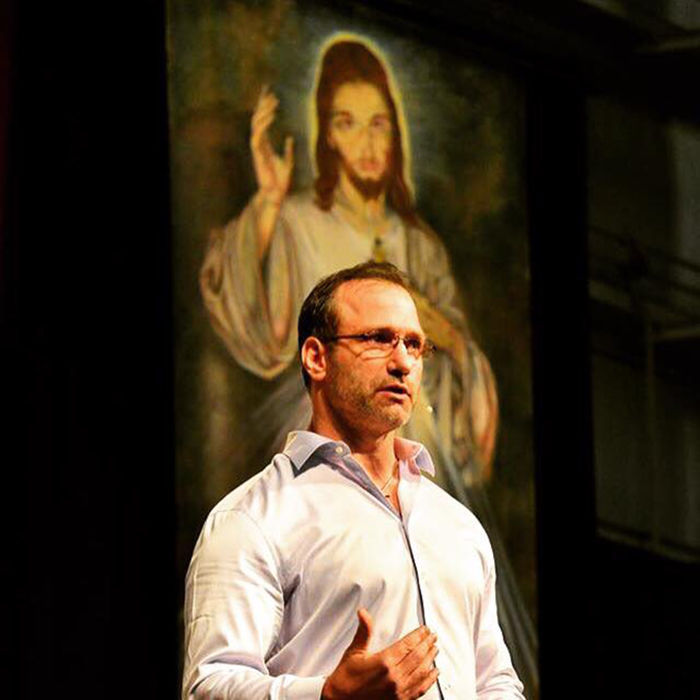In 1998, NFL linebacker Chris Spielman — an OSU standout who went on to play for the Detroit Lions, Buffalo Bills and the Cleveland Browns — stepped away from an entire NFL season to help his high school sweetheart and wife Stefanie, who was diagnosed with breast cancer while pregnant at the age of 30.
After several recurrences of the disease, she died in November 2009, leaving Chris a single father of four children, then aged 7 to 15 (he’s since remarried and added stepchildren).
Prior to her death, Stefanie became a vocal supporter and fundraiser for breast-cancer research and treatment, with her previously-shy husband as a public partner, something he has continued after her death.
Both the Spielmans turned to their Christian faith for support. Chris, a Catholic, frequently speaks to Catholic and other Christian groups about the importance of faith (learn more at chrisspielman.com).
Having watched his beloved wife suffer and eventually die, Chris — now also an ESPN analyst — has a strong perspective regarding when prayers for healing or deliverance appear to go unanswered. Obviously, the Spielmans included such pleas in their prayers, but while Stefanie did go into remission more than once, the cancer ultimately claimed her life.
Speaking to The Tidings, Chris Spielman emphasized that her death doesn’t mean their prayers weren’t answered, rather that the answer just wasn’t what they were hoping for.
According to Spielman, there comes a point in every person’s life when they have to ask themselves, “Do you really want God’s will in your life or don’t you?”
“If you do, then you have to accept what God has in store, and so I believe that all prayers are answered,” he explained. “If we claim that God’s will for my life or thy will be done, like it is in the Our Father, then we have to accept whatever that answer is to the prayer.”
Spielman also spoke about surrendering to the will of God, which is especially difficult for Americans — and, in particular, professional athletes — whose ethos is built on rugged individualism and never giving up.
Thinking about that, Spielman cited passages 2 Corinthians 12:8-10:
“Three times, I begged the Lord about this, that it might leave me, but he said to me, ‘My grace is sufficient for you, for power is made perfect in weakness.’ I will rather boast most gladly of my weaknesses, in order that the power of Christ may dwell with me. Therefore, I am content with weaknesses, insults, hardships, persecutions, and constraints, for the sake of Christ, for when I am weak, then I am strong.”
“We have to trust in God,” said Spielman, “and surrender to God whatever we have, whether it’s our burdens or our joys, and trust God with those.
“I really become the strongest person in the world by becoming weak and surrendering to God. I don’t know if that makes sense to you, but it does to me, in my mind.”
In the NFL, there are plenty of openly religious players, and expressions of faith are common on the field, though the TV networks may try to cut away from them. On Nov. 1, when Seattle Seahawk Ricardo Lockette suffered a neck injury in a game against the Dallas Cowboys, players from both sides could fleetingly be seen taking a knee and praying for him.
On the other side, a Washington State high school football coach was suspended for leading silent on-field prayers with teams after games. In the wake of the Nov. 13 terror attack in France, New Orleans Saints player Benjamin Watson tweeted on Nov. 16:
“As a nation we have collectively prayed for Paris this week. Yet as a nation we suspend a football coach for praying after a game. We must choose.”
But Spielman knows the ultimate outcome of disputes like this, saying, “God is always victorious and will be victorious. He was in the beginning, and he is now. If you’re a believer in the Bible, you believe He’s victorious in the end.
“You just keep doing what you’re doing. You stand up for religious freedom, but the people on the other side are fighting a losing battle. They just don’t know it.”

